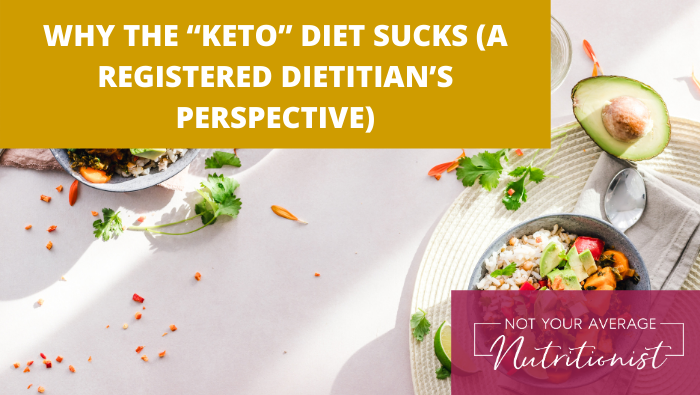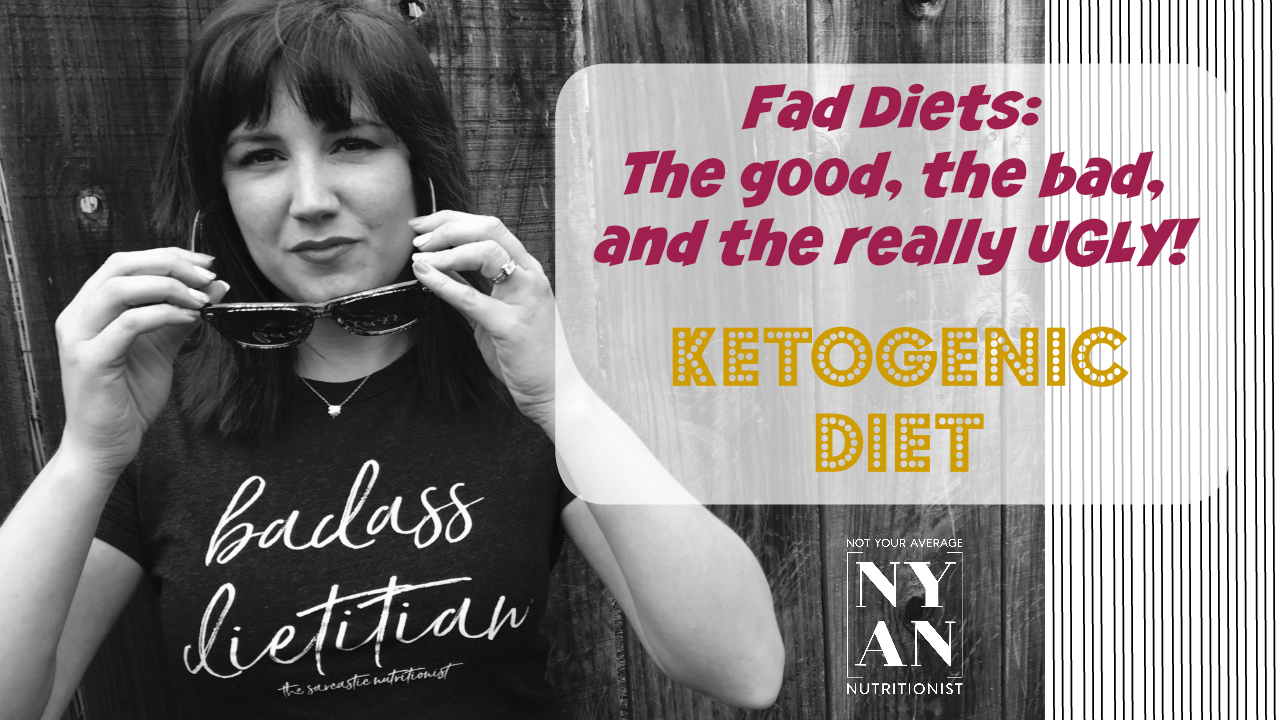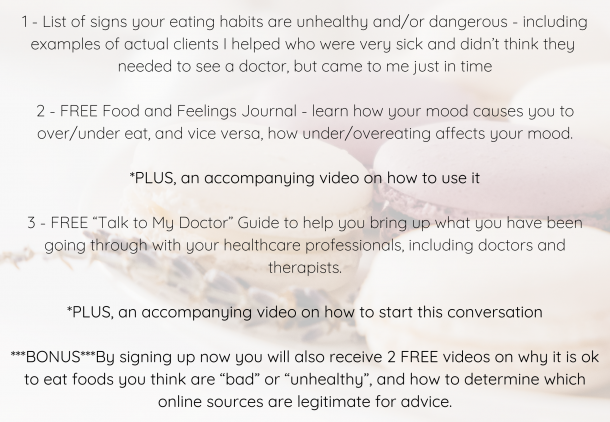As a RD, I have gotten so many questions about the fad diet du jour: the “Keto” or “Ketogenic” diet. I finally decided to just write down the research in a reader-friendly version. Additional video on the history and use of the ketogenic diet at the bottom of this post. Here you go-
The ketogenic (or “keto”) diet is just another fad diet.
The Keto diet is an amped-up Atkin’s diet (that we all know now was/is terrible for your cardiovascular system, and not a sustainable way to keep weight off) where the majority of what you eat comes from fat, and carbohydrates are extremely limited (In contrast, a healthy diet should be a much more balanced macronutrient distribution of 20-35% protein, 45-65% carbohydrate, and only 10-35% fat). This skewed macronutrient distribution is actually very dangerous for the human body for several reasons –
#1, We use carbohydrate as fuel for our brain. Glucose is needed for cognitive function, and many people on the Ketogenic diet experience brain fog and difficulty focusing. Ketone bodies (specifically: beta-hydroxybutyrate (built up in blood serum), acetoacetate (found in urine), and acetone (responsible for that bad breath)), which are created when carbohydrates are not present, are not as effective (or healthy) for our brain. This may also cause metabolic acidosis which is characterized by a reduced pCO2 and/or lower pH (we need to stay in balance!).
#2, On a ketogenic diet, your intake of fruits and vegetables is extremely limited (if eaten at all) and we all know how important the fiber, vitamins, minerals, and other compounds in fruits/veggies are. On that note…
#3, The keto diet is extremely low in fiber! Fiber is not only protective against many gastrointestinal cancers, it is also a big factor in fullness and weight loss. Furthermore, constipation is very common on low-fiber diets like the Keto diet.
#4, Ketosis/ketoacidosis is what is happening in the body/brain on a chemical level – this is the body making fat into something the brain can use when carbohydrates are not available. It’s a lot of work for the the body to produce, not as efficient as carbohydrate, and can be incredibly dangerous for diabetics. Additionally, we have some cells with few-to-no mitochondria. These cells are carbohydrate-dependant and must be fueled by glucose. These cells include certain cells with no mitochondria in our blood (erythrocytes), eyes (cornea, lens, and retina); cells with few mitochondria include renal medulla, testis, and leukocytes. (https://link.springer.com/article/10.1007/s11883-003-0038-6)
#5, “Keto breath.” Halitosis (bad breath) from (acetone) ketone bodies makes for an acetone-like smell on your breath that no amount of brushing/mouthwash can fix. Medical professionals look for (smell for?) this in malnourished patients.
#6, High blood lipids/cholesterol/blood pressure. It’s a high fat diet- you didn’t see this coming? The body can only break nutrients down at a certain rate, and high levels of fat in the diet may lead to high levels of blood lipids are responsible for blockages (atherosclerosis), and other cardiovascular complications up to death. While you can reverse the numbers, the plaque buildup in arteries is almost impossible to reverse. Not worth it! (note: some people do see lowered blood lipid profiles on this diet).
#7, Following this diet is often a form of disordered eating or may lead to an eating disorder (just as with any restrictive diet). Cutting out whole food groups is not healthy. We need all 3 macronutrients in appropriate proportions (majority coming from carbohydrates) to have a healthy body. Our body needs a variety of foods for best health. The reason this diet “works” for weight loss is that it restricts the types of foods that people tend to over-do-it-on like chips, candy, pastries, etc. Any diet that cuts out your favorite foods will cause weight loss, but at what cost (physically and mentally?)
#8, Not all fats are created equal. Most people starting a Keto diet are not differentiating between saturated (solid at room temp, and not something we want in large quantities) and unsaturated fats (liquid at room temp, and “healthier”). Getting this wrong also increases complications from the diet. Additionally, many people who followed a diet high in medium-chain-triglycerides (MCT) experienced undesirable digestive issues.
#9, It may mess with your thyroid and other hormones – lowering your metabolism (isn’t the point of this diet weight loss? That’s counter-intuitive…), energy, and fertility. Every time we lower our metabolism through dieting it lowers the “set-point” of our metabolism, making it harder and harder to lose weight. This is an adaptive response for mammals in famine, but not what the average person wants nowadays.
Who it the Keto diet appropriate for?
The only population that the ketogenic diet is scientifically proven to be beneficial (and safe) for is a select group of people with epilepsy (seizure disorders). This is the position of the Academy of Nutrition and Dietetics.
The Keto diet especially sucks for athletes (and people working out to lose weight)
Since our preferred fuel source is glucose (carbohydrate) from either blood glucose or glycogen (fancy term for carbohydrate stores in the liver and muscle cells), running exclusively on fat slows athletic performance as the body works much harder to break down fat (dietary and adipose storage).
Additionally, the lower protein intake and change in hormones in the body with a keto diet lower the ability to build and maintain muscle mass. If “mirror muscles” like biceps are not motivating enough to keep you off it- remember that our organs like the heart are also muscle tissue that would be broken down by this diet, causing organ damage or failure.
It’ll get you, mentally and emotionally
Ketogenic diets cause headaches, brain fog, and often irritability and obsession with food. This type of diet will very likely make you think about food an unnecessarily large amount of time, and make it difficult to be social (not being able to eat at the same places as your friends; oh, and that bad breath!).
You may feel more depressed (especially if you are already prone to depression and/or taking antidepressants) as serotonin (the “happy” neurochemical) is produced from carbohydrates. If you take an SSRI know that this class of medications work directly on serotonin that is present, and the diet requires a minimum about of carbohydrate (as we learned from the works of Ancel Keys in his starvation study) to allow the SSRI medication to work.
So, what’s the verdict?
In case you didn’t get it from the above – the Keto diet sucks. Not only is it a fad-diet (aka – not suitable for long-term weight loss/lifestyle), it can be very dangerous.
If you need help figuring out what to eat, contact a Registered Dietitian. In the meantime, if you do need some structure, balanced eating like the Mediterranean diet or DASH diet is a better way to go.
For a YouTube video with more information on this diet: click the image below
Further reading:
https://www.eatrightpro.org/-/media/eatrightpro-files/practice/position-and-practice-papers/practice-papers/classicandmodifiedketogenicdietstreatmentepilepsy.pdf?la=en&hash=681AA0895DFBF515C2A3A2FE7DA3EB5F68832D65
Don’t give up the foods you love. There is room for all foods in a healthy diet. We just need to keep proportions and variety in mind to fuel our body optimally.



